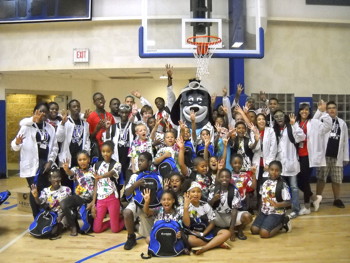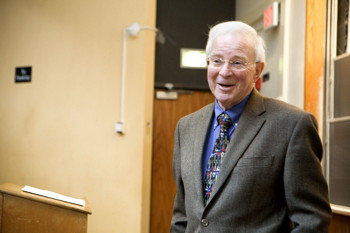COVER STORY
Action Teens, apples and the spirit of democracy: Cornell's culture of public engagement expands the definition of 'land grant'
Page 6 of 9

Campers and teen leaders in Binghamton, N.Y., at the end of Eat4-Health Day, where teenagers taught schoolchildren about making healthy food choices. Photo: June Mead. See larger image
In May, CHAT and CHFFF were selected by the National 4-H Council for a 10-state project funded by United Healthcare. Soon, children as far away as Mississippi and Arizona will be learning to eat smaller portions and steer clear of sugary drinks, following lessons developed at Cornell.
June Mead, the association issue leader for Children, Youth and Families in the Broome County CCE, has seen how well CHAT and CHFFF work. Participants in her Citizen U program for at-risk teens are using the curriculum in after-school programs in Binghamton. In October, she traveled to Florida to accept an award from the National Association of Extension 4-H Agents' Urban Task Force for Citizen U's efficacy.
A way out, and up

Richard Polenberg See larger image
Twelve men, all wearing green pants and drab shirts, sit at desks arranged in a semicircle. They are inmates at the Auburn Correctional Facility, a maximum-security prison less than an hour's drive from Cornell's Ithaca campus. Built in 1816, Auburn is the oldest operational prison in the United States.
The youngest man is in his 20s; the oldest in his early 50s. All hang on the lecturer's every word, their hands busy jotting lecture notes, their eyes alive with interest.
The course is The Supreme Court, the Constitution and Criminal Justice. The teacher is Cornell Professor Emeritus Richard Polenberg.
<<View entire story as one page>>
